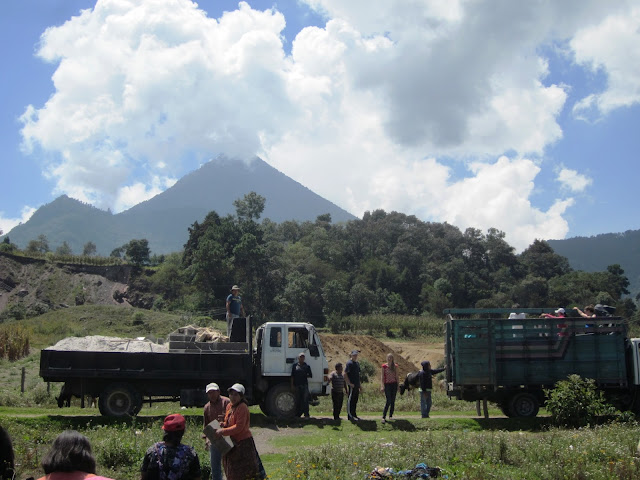Text by Elizabeth Barnes
Disappointingly, last Tuesday's plans to hold a mobile clinic in Xeabaj fell through—rain was so heavy that we couldn't drive there safely. But our
Timmy Global Health Brigade volunteers made the best of the setback. After learning more about Guatemala in the morning's cultural competency training, the group headed out to Fuentes Georginas to relax in the beautiful hot springs.
Then on Wednesday, to make up for lost time, we took the mobile clinic to Pujujil.
 |
| Every mobile clinic begins in the Pop Wuj clinic in Xela, where Timmy volunteers double-check all the equipment and medicine for the day before carrying it out to the minibuses. (Photo by Elizabeth Barnes) |
 |
| Ashley Aue, Medical Programs Coordinator for Timmy, passes a bin up to one of our drivers. About a dozen bags and bins were strapped to the roofs of our minibuses for the journey. (Photo by Elizabeth Barnes) |
Our three minibuses left Xela before 7:30 a.m. and drove for two hours along Guatemala's steep and winding roads to reach Pujujil.
 |
| Pujujil is a village in the department of Sololá, east of our home base in the department of Quetzaltenango. (Photo by Albizael Del Valle) |
Many of our patients in Sololá either know only the Mayan language Kaqchikel or feel more comfortable speaking it than speaking Spanish, so translators from the community stepped up to help our doctors.
 |
| Timmy staff, volunteers, and translators gather first thing in the morning for introductions. Kaqchikel translators wore duct tape name tags to make them easy to recognize. (Photo by Albizael Del Valle) |
The building we used was not designed for medical use, so our registration, lab, and pharmacy stations and their respective waiting areas were all in the same big room.
 |
| To the left, from front to back, are the vitals station, lab station, and registration desk where patients first check in. To the right is the pharmacy and education station with a large waiting area behind it. (Photo by Albizael Del Valle) |
 |
| Lab station personnel check the results of a patient's urine sample. Doctors referred patients to the Pop Wuj clinic in Xela for more complex tests. (Photo by Elizabeth Barnes) |
 |
| Nurses measure patients' weight, height, and blood pressure and take their basic medical histories and reason for visiting at the vitals station. (Photo by Elizabeth Barnes) |
To preserve patients' privacy, sheets hanging from the walls and ceiling formed individual consultation rooms.
 |
| Doctors and their translators brought patients back here for their examinations. (Photo by Albizael Del Valle) |
 |
| The pharmacy team sets up the huge bins of medicine brought from the United States. (Photo by Elizabeth Barnes) |
 |
| Toward the end of the day, patients wait in the pharmacy for their prescriptions. Although most of the Timmy medical team spoke only English, Spanish and Kaqchikel translators were always on hand to ensure that patients understood what they were receiving, why the doctor had prescribed it, and how to administer it properly. (Photo by Elizabeth Barnes) |
Our Pujujil patients were grateful to receive such excellent medical care in their own community and in their own language. After handing out the last prescription and packing up, we all returned to Xela in time for Timmy volunteers to eat, freshen up, and go to a salsa dancing lesson. Thanks to everyone for a successful Wednesday!






















































